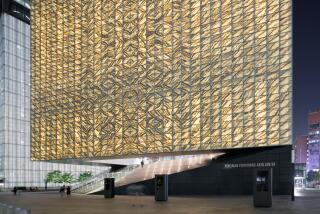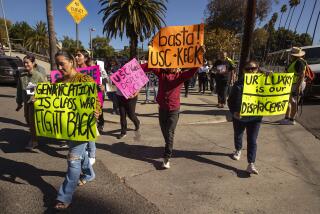Wiesenthal Center Says Traffic Won’t Increase : 60 Turn Out for Museum Hearing
- Share via
About 60 residents of the Pico-Roxbury area turned out Monday to hear representatives of the Simon Wiesenthal Center defend their plans for the proposed Museum of Tolerance.
Leaders of the center want to build a 53,000-square-foot building on the corner of Pico Boulevard and Roxbury Drive. They say the facility will not generate more traffic on nearby residential streets, but residents disagree.
The center operates a Jewish high school, a college with dormitories and a museum at 9760 Pico Blvd. It also owns an adjacent lot, now occupied by a plant nursery, where it plans to build the Museum of Tolerance plus a 325-seat auditorium and three tiers of underground parking.
Part of the undeveloped property is zoned for multi-family residences and part for single-family residences. In order to complete expansion plans, the center has asked that these portions be rezoned for commercial use.
Vote Scheduled
Hearing examiner John Parker said residents have more two weeks to submit written objections to the zoning changes. The Los Angeles Planning Commission is scheduled to act on the issue on June 20, but could postpone its decision by three weeks.
William S. Smolen of the Casden Co., the developers, speaking for the center, said that new buildings would be limited to 45 feet in height. The plans also call for a 45-foot setback on Roxbury Drive and extensive landscaping.
Sketches displayed at the hearing show new structures on the Roxbury side of the site, fronting on Pico Boulevard. They also depict a 154-space underground parking area with an entrance at the south end of the center’s property. An 11-foot, 5-inch wall is also proposed at the south end of the property, which abuts a residence.
The driveway to the new structure would be on Roxbury Drive. An existing 75-space parking lot behind the school on Castello Avenue would remain.
Smolen said that these plans have not been approved by the city and may be changed.
About 25 of those attending, many of whom were Jewish and a few of whom said they were survivors of the Nazi regime, voiced their support for the school and the museum, but persisted in their objections to the requested zoning changes.
Some residents accused students of littering the neighborhood and said the center grounds are not well kept.
They said they feared that expansion will increase traffic congestion and on-street parking. Residents said they cannot park on the streets now, and in some cases have found students’ cars blocking their driveways.
One woman said she was forced to park in her driveway with part of her car blocking the sidewalk and that students had slashed her tires.
A traffic study conducted by a private company and based in part on figures provided by the Los Angeles Department of Transportation was presented by John Dillon of Crain & Associates. Dillon said that other building projects now proposed in the area will increase traffic to a level where it will be “congested, but not intolerable, not a gridlock” situation.
Popular Shortcut
The congestion has already irritated residents who claim that in addition to traffic generated by the center, other drivers use Roxbury Drive as a shortcut from Century City.
Rabbi Meyer May, executive assistant to Rabbi Marvin Hier, dean of the center, said that the center needs the support of its neighbors to carry out its goals of educating people about intolerance.
The center has been a stabilizing influence on the Jewish community, he said, and will increase the cultural quality of life.
May promised that immediate steps would be taken to eliminate traffic and parking problems caused by students and their parents.
The center attracts an estimated 25,000 visitors annually.
May said that tour groups will be encouraged to use buses or car pool vans instead of driving their own cars. He also said that complaints about buses parked on the streets with engines running will be eliminated by having buses discharge their passengers on Pico Boulevard, instead of on the side streets, and then leaving immediately.
More to Read
Sign up for Essential California
The most important California stories and recommendations in your inbox every morning.
You may occasionally receive promotional content from the Los Angeles Times.










